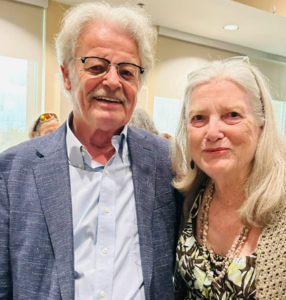My Thoughts on Machiavelli
 Dr. Martyn Thompson (pictured left with NOSHA member Lucy Wells Tierney, the author) described Machiavelli at NOSHA in May. My take: The end justifies the means; it’s in a cycle. Here are my rough and ignorant notes, only for you few: Machiavelli on the Use and Purpose of Political Violence
Dr. Martyn Thompson (pictured left with NOSHA member Lucy Wells Tierney, the author) described Machiavelli at NOSHA in May. My take: The end justifies the means; it’s in a cycle. Here are my rough and ignorant notes, only for you few: Machiavelli on the Use and Purpose of Political ViolenceM (Machiavelli) told his readers he travels a road no one has travelled before me, abandoning commonplace morality for the truth about political reality. What does he mean by political violence? We live in violent times, in Europe and U.S. for a long time.
Recently politicians borrowed totalitarian movements from [earlier times]. Disastrous first world war, shared Fascist slogan. Fascists epitomized M, adopted him as a prophet, intolerant, separate morality from politics.
When Mussolini became prime minister 1922, he set about in M fashion to attack the [Socialist Party]. He used M to attack liberal democratic principles. Popularity always fails; fear is [much better] to rule and to consolidate political power. “The Prince” is indispensable, a playbook for this Italian. Mussolini became a millionaire. In 1926 Italian Fascists learned from M doctrine and actions as well. Black Shirts had violent actions and glorified them. This is by definition lawful, fascist totalitarianism.
Mussolini had one important competitor in 1939, Wilson, who had been an admirer of Hitler before the invasion of Czechoslovakia. They had diametrically opposed views, Wilson’s M was based on discourse, enduring relevance.
In 1512 “The Prince” dedication notes his knowledge was derived from personal experience. In the last chapter, he wanted to reunite Italy and he wanted that job for himself, having had inside experience.
In 1469 there was constant European war. 1494 French armies … and Italian self-esteem suffered a severe shock. 1498 at age 29, M was appointed to the foreign affairs office. Mercenary armies, Spanish and German terrified Italy with their cruelty.
The Medici banking family was swept from power in 1495. The ruler had corruption, was excommunicated and overthrown in 1498. He suffered imprisonment, torture and was burnt to death like his victims. M witnessed this.
Borgia was cruel to all opposition BUT was the consummate politician, out for his own aggrandizement rather than civic.
When the republic fell in 1512, M was arrested, tortured and sent to house arrest, so he studied Cicero, Livy and Roman republicans. This was his second source of evidence. M had greatest admiration for this Roman institution: a mixed constitution with liberty and civic virtue.
How to attain the ideal through [autocratic] government. A ruthless [family] could promote unity, then political skill could promote the ideal. Both Mussolini and M have political violence but M’s aim, method was to the real world, not an ideal world of religious and political…
M defends institutions, despised and loved men. M’s style was provocative, outrageous and had stark alternatives but over-simplifies reality. How many principalities and hereditary estates are there? Unbelievable. States are either republics or principalities. M over-simplified i.e. Austrian empire.
In different circumstances, use love or fear, liberality or … Black and white, so he contradicts himself.
There was national regeneration under the Medicis, but M despised … Contradictions are essential to M: Fortuna? Liberty? Fortuna: whether human affairs are affected by skills? Or corruption. Interrelationships dispensed with moralizing, determination with manly qualities, expedient to follow moralism or … A politician’s objectives. A gifted, determined person can control part of their fate. Nothing lasts forever. Corporate rather than individual. M is obsessed by the concept of corruption.
Success brings tranquility. Tranquility brings laziness. Laziness brings disorder. Disorder brings corruption. So empires rise and fall. Cause and effect of self-sacrifice, corruption. Debauchery brings factionalism, parties rather than public good.
To M, Italy was at the bottom, a playing field of Fortuna, a thankless woman. M would explain the sources of corruption. Human ingenuity will eventually fail. At the beginning (again) construct political order from chaos through [violence] then …
There was chaos when refugees from Troy, Romulus and Remus vied for political leadership. Romulus killed his brother rather than share leadership. Romulus created a republic. A wise leader concentrates his leadership, so absolved from blame.
M said one man organizes government but aristocratic council. Then democratic, constitutional government. Founders of republic through tyranny is bound to fail or monarchy.
M is different from Fascists or contemporary Neo-Fascists who say violence is an ideal, eternal law of man, enforced, individual subordinated to the State. M said Fascism = Tyranny. Success or failure don’t revolve around right or wrong. Order [comes first] or chaos would reign. Political violence is okay for civic liberty, to defend against tyrannical attack. In 1770 the American colonies were inspired by M and their aim was to create a democratic constitution.
~by Lucy Wells Tierney
